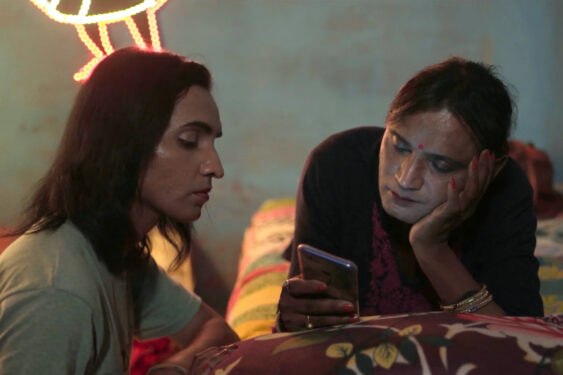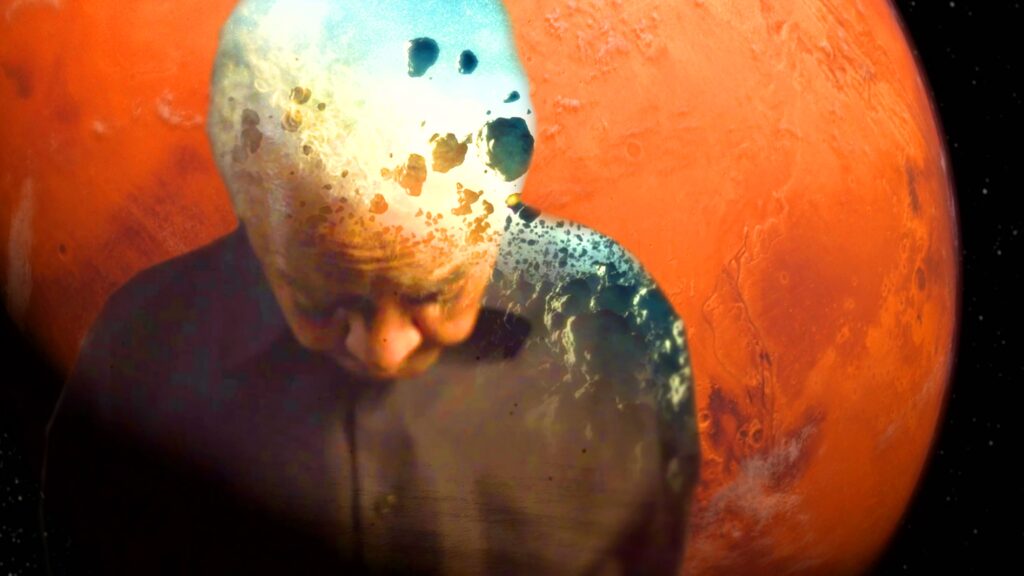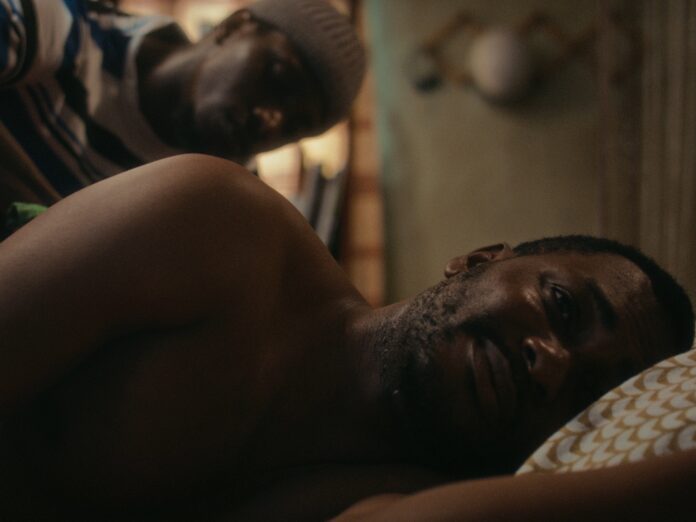The BlackStar Film Festival will take place in Philadelphia, August 2-6 at area venues including The Perelman Theater at the Kimmel Center, The Suzanne Roberts Theatre, and the Lightbox Film Center as well as online. This year’s slate of films — by, for, and about people from the African diaspora and global communities of color — includes four LGBTQ+-themed feature films as well as five queer-themed shorts. Here is a rundown of what to watch.
One of the best films of the fest (and possibly the year) is “All the Colours of the World Are Between Black and White,” a remarkable drama about Bambino (Tope Tedela), who strikes up a close friendship with the charismatic photographer Bawa (Riyo David) in Lagos. The men convey their unspoken attraction and desires through silent glances that are full of longing. A lovely, affectionate moment has Bambino wiping food from Bawa’s mouth at a café. But when Bawa touches Bambino’s arm in public, it causes tension. Bambino is full of fear and self-loathing about being identified as gay in Nigeria, where homosexuality is criminalized. “All the Colours of the World Are Between Black and White” is slowly paced, but that allows viewers to sit with the characters. Each scene is gorgeously framed, and the story builds to a brilliant final moment. Writer/director Babatunde Apalowo has made a brave film that deserves to be seen.

Another feature that is highly empathic is the drama, “A Place of Our Own,” directed by the Ektara Collective, about Laila (Manisha Soni) and Roshni (Muskan), two transgender women in Bhopal, India. Laila is spending the night in an apartment she and Roshni have rented when she is harassed by a male neighbor. Finding the situation untenable, the women are evicted and hole up in a friend’s empty apartment as they look for another place to live. Their efforts are fraught, and their time is often wasted. One possible housing option is dismissed because the landlord will not rent to “these people.” Another opportunity has the agent asking questions about Laila and Roshni to satisfy his curiosity about trans people, rather than discussing apartments. The women are kept out of society, insulted, and even injured as they try to enjoy the same basic human rights as everyone else. “A Place of Our Own” shines a necessary light on the trans experience in India, but the discrimination it reveals is certainly taking place worldwide.
“Going to Mars: The Nikki Giovanni Project” directed by Michèle Stephenson and Joe Brewster, is a celebratory portrait of the esteemed poet. Filmed over the period of a several years, Giovanni is seen reading poems such as “The True Import Of Present Dialogue, Black vs. Negro,” and speaking truth to power in various settings — locally on WHYY’s “Radio Times” and at the Philadelphia Free Library — as well as in archival interviews with James Baldwin on the TV show, “Soul!,” on a stage with Pearl Cleage, and at the Apollo Theater. Giovanni talks about her family, from her difficulties with her abusive father, to her love for her granddaughter, as well as civil rights, and “going to Mars.” (Giovanni thinks Black women should be first to visit Mars to check it out). There is a brief segment dedicated to a controversy that arose over her reluctance to protest against Apartheid. Giovanni’s spouse, Virginia Fowler, is featured in a handful of scenes, but the film does not concentrate much on their relationship. With its focus on Giovanni and her impact (especially on fans), “Going to Mars” is a bit hagiographic, but that does not make it any less inspiring.

“This Place” is an earnest Canadian drama about two young women of color who fall in love. The film opens in 1989 with a sequence in a Montreal airport that strains credulity. Cut to 2011 Toronto, where Kawenniióhstha (Kawennáhere Devery Jacobs) loses her notebook in a laundromat and meets Malai (Priya Guns). Kawenniióhstha, is Mohawk and a creative writer who has just moved to the city. She hopes to connect with the Iranian father she never met. Meanwhile, Malai, who is Tamil, is considering graduate school. She has been contacted by her dying father, whom she has not seen in several years. The family issues lack emotion, and this well-meaning film is pitched at such a low key, it is hard to invest much in the characters who are mostly one-dimensional. The acting and filmmaking are as amateurish as the script. Arguably, the best scene has the young women going dancing — perhaps because they don’t talk; the film’s dialogue is painfully didactic.
Among the LGBTQ+ short films, the best is the upbeat documentary, “The Alexander Ball,” which showcases the members of the House of Meanjin in Brisbane, Queensland. Mothered by Ella Ganza, the film eavesdrops on their rehearsals and family meetings, as well as the dressing room and Ball performance. Members of the House walk in categories including runway, sex siren, femme queen and old way vogue. The subjects are all very engaging and the Ball is entertaining to watch, but the appreciation of trans women of color, who are “never celebrated for who we are” gives “The Alexander Ball” its heart.

“The Aunties” is a tender documentary portrait of Donna Dear and Paulette Greene, a married couple who now live on the farmland where Harriet Tubman’s family once lived in Carolina County, Maryland. The women, who have been together 50 years, talk about their lives, history, and thoughts about freedom and slavery.
Another documentary, “Here, Hopefully,” is an inspiring chronicle of Zee, a nonbinary Chinese nursing student in Iowa who is hoping to pass an exam to remain in the United States. They explain their gender dysphoria and being treated poorly at home in poignant remarks as they hope to eke out a life in the nursing field in America.
“Wetlands of Our Mother’s Tongues in Concrete” is director Jordan Deal’s experimental short that often features three panels that screen various images and environments as two voiceovers talk about forgiveness, family and coming into their transness.
The longish (49 minutes) short, “Between the Colony and the Stars,” is set in the colony Juliano Moreira, where there is polluted water and people are disappearing. Estelar (Timbuca Hai) is a nursing technician whose trans brother Kalil (Lorre Motta) comes to stay with her. However, when both Estelar’s colleague, Ursula (Ana Flavia Cavalcanti), and Kalil drink some contaminated water and disappear, Estelar searches for Kalil. This intriguing film features a talking animal, and old, digitized VHS images of the colony as it tells a story about reinvention and acceptance.
For tickets, showtimes and more information, visit https://www.blackstarfest.org/festival/

